- Home
- Lisa Gardner
One Step Too Far Page 9
One Step Too Far Read online
Page 9
I rubbed some of the bourbon at the top of my lip. I licked more and more off my hands, took tiny sips from the cap. I felt, bit by bit, the warmth spread through my veins. Then I inhaled until the boozy scent formed into the shape of my father, grinning beside me.
We are camping in the backyard. The night is cold but our tent is cozy thanks to my stockpile of blankets. My father tells me this is the best adventure he’s ever had and look at that shooting star and oh, he has one more ghost story to share. And we talk and laugh and stuff ourselves with marshmallows straight out of the bag because he never let me build that fire. Then we chase down the marshmallows with chunks of dark chocolate and broken pieces of graham crackers and it tastes so good we declare we will never eat s’mores any other way. We fall asleep still laughing.
My father and me.
On the camping adventure that never happened. And the relationship that never was.
I never camped again. My father had more moments of sobriety. Followed by more moments of failure. Such is the ride.
My mother . . . she worked, she endured, she nursed her rage. First at him. Later at me.
Till the day I graduated. I don’t remember it, being so well and truly wasted that even my father regarded me with pity as I stumbled home at four in the morning. Then soon enough, I was gone, off to bright lights and hard partying in LA.
Till one day, hundreds of miles away, a driver swerved across the center line. He hit a vehicle head-on, and just like that, my parents were dead.
I took the call standing outside a bar, one finger stuck in my ear to drown out the background noise as I listened to my aunt’s words. I think I nodded. Then I went back inside, to the business at hand.
I never met my parents as a sober adult. I never got to show my father this disease could be beat. I never got to prove to my mother that I took after her more than she thought; I’m a good worker, I know how to get the job done, I can make a difference in this world.
She knew I loved my father. She died before I could tell her that I loved her, too. That I did admire her. That my father might have been my favorite playmate, but she was my hero, and I never would’ve gotten my act together if I hadn’t had the example of her strength to guide me.
Unfinished business. An addict’s life is filled with such instances. The coulda, woulda, shouldas that will never happen again.
It helps me relate to the families I assist. Enables me to understand why Martin is driving us now, step after brutal step, deeper into the mountains.
Until we finally arrive at this place, Devil’s Canyon, where we stagger to a halt, half of our group still vertical, the other half of us dropping like rocks.
“This is it,” Nemeth declares, gesturing to a flat clearing next to a vast blue lake. “Home sweet home for the next six days. Everyone, welcome to our campsite.”
I think of my father and the backyard and the camping that never was, and I do my best to hide the exhausted tears running down my cheeks as I finally wrest the pack off my shoulders. I’m not the only one struggling; Neil, Scott, and Miggy appear equally wrung out.
“You are a goddamn asshole,” Miggy bursts out suddenly. He points a finger straight at Martin. “Haven’t you ruined our lives enough by now? We loved Tim, too, you know. Trying to kill us year after year doesn’t change a goddamn thing.”
He throws his pack on the ground and stomps off into a patch of trees.
Which is how I officially know this isn’t the end of our ordeal, but just the beginning.
CHAPTER 11
Devil’s Canyon appears to be a broad, flat expanse that spreads out . . . forever. The lake before us is framed by a staggering gray-brown cliff face and more red-and-green-streaked mountains in the distance. Up close are patches of dark woods interspersed with meadows of sun-dried grass and plains of dusty earth.
I understand at least part of Miguel’s temper tantrum. An entire day of grueling hiking later, my feet roar, my shoulders have knotted into a solid bar, and I’m not sure where the pain ends and I begin. Hard dirt and an ice-cold lake? I want a soft bed and bubble bath. Even Daisy has plopped down with an exhausted sigh. I wonder how much Tim’s former college friends still hike in their real lives, or if this is the yearly torture test, as Miggy claims.
I study Martin’s face for his reaction to the outburst, but his expression remains inscrutable as he begins unloading his pack.
Nemeth starts pointing and commanding. Fire here, latrine there. First clump of tents here, second there, third over here. As the two females, Luciana and I are assigned our own little corner of dirt. The bachelor buddies form the next grouping of three, leaving our fearless leaders as the final trio.
I don’t know what to do next. I have no idea how to set up a tent, establish a campsite. I never managed to spend a single night in my own backyard, so how the hell am I supposed to fake my way through this? Everyone seems to be unloading gear, so I follow their lead. Luciana already has her shelter spread out on the ground. Watching her, I’m filled with the age-old terror of making a mistake, looking foolish. How is it we all leave high school, but high school never leaves us?
Bob appears by my side. For a big guy, he moves with surprising stealth. He glances from my tent, still in its drawstring bag, to me.
“If you could start gathering wood for the fire, I can set up your tent,” he says.
I’ve never been so grateful.
I walk circles around the emerging campsite, picking up kindling, then bigger sticks, then just random dried twigs, because at this stage of the game, to stop moving is to collapse, and I can’t afford to drop dead. I spiral out farther, weaving through the closest screen of pines before eventually stumbling across Miggy. He’s sitting at the edge of the massive lake, tucked behind wavy grasses and looking at nothing in particular.
I glance back at the campsite, a distant whir of activity I can barely make out through the trees. Then I set down my armful of dry twigs and take a seat next to Miguel.
I don’t speak. In this day and age, we all talk too much and hear too little. Listening has become a forgotten art that the world is sorely missing.
“I’m sorry,” Miggy says shortly. He picks up a rock. Throws it at the lake. It lands with a small plop.
“How are you feeling?” I ask him.
“Terrible. Like a guy who works a real job day after day, because that’s the responsible thing to do, then once a year gets thrown back into the mountains because my best friend who disappeared five years ago happened to love camping, and his father has hated us ever since.”
“You don’t hike on your own?”
“What’s your name again? Frankie?”
“Frankie.”
“Take it from me, Frankie, I would never step foot on a trail again if I had my choice. And Josh, Neil, Scotty—they agree with me. We lost enough that night. Martin’s yearly death marches don’t make anything better. They just torture us all over again.”
“Is that why Josh drinks so much?”
“Maybe. You’d have to ask him.”
“Are you four still in touch?”
Miggy picks up another pebble. He slices it through the air, watches it skip three times across the water. “They were my brothers,” he states quietly. “I thought nothing would break us.”
I understand what he’s saying. Or rather, not saying. That shared trauma can bond, but more often than not, it severs. The guilt. The pain. The need to move forward, the agony of letting go. Five guys went into the woods. One has never been seen again. And the other four . . . they are not who they used to be either. Life is like that.
“Do you still live relatively close?”
He nods. “Beaverton has quite a few major tech firms. Scotty, Neil, and I all work in that area. Josh went the manufacturing route, but his firm is just around the corner. Getting to be you can’t throw a rock without hitting an enginerd in
that town.”
“But no catching up at bars after work, weekly game of hoops, periodic college reunions?”
“We tried, after we came back. But . . . it didn’t feel the same anymore. No one knew what to say. How to act. Do we sit around and talk about Tim? Do we pretend it never happened? We couldn’t figure it out. Josh broke first. Stopped coming around, returning calls. When Marty contacted us about a renewed search effort one year later, I was surprised Josh showed up. It was the first time any of us had seen him in months. He seemed distant, but who were we to tell him how to cope? He continued to withdraw after that, though. I heard rumors of a DUI. That he was having difficulty at work. I thought of picking up the phone, but I just couldn’t do it. Two days ago was the first time I’d seen him since last year. Just looking at him . . . Goddammit. We fucking failed him. Again.”
He throws another rock into the water, then a second, third, fourth, in rapid succession. No fancy skipping, just unfocused rage.
“We’re all here because Marty owns our asses and he knows it,” Miguel says at last. “But even assuming we stumble upon Tim’s body tomorrow . . . will that actually change anything? Will Josh stop drinking? Will Martin finally hate us less than we hate ourselves?”
He glances at me but I don’t answer because I already know it’s not my words he needs. This kind of search is distinctly personal. For some, finding answers does bring closure. For others, finally knowing what happened to their loved one only makes their nightmares that much more specific.
Miggy returns to staring at the rippling lake. “I was scared that night,” he states abruptly.
“Because Scott had already disappeared?”
“Because . . . because of the screams and that noise and . . .” He shakes his head.
I wait.
He picks up three more stones and fires them off.
“We were so damn drunk. Sometimes, I’m not sure what even happened. Was it a bad memory or a fragment of a nightmare or an alcohol-induced hallucination? We hiked in. We set up. Campfire, dinner, beer. Then . . . everything went to shit. Yelling and screaming, sounds from the woods. Scott’s gone and Josh . . . Josh is so upset. And I know why except I don’t know why. It’s like a blurry movie reel, and the more I try to see, the more out of focus it gets.”
“When you first think about that night, what immediately pops into your head? How do you feel?”
“Terrified.”
“What do you want to do?”
“Get away. Get the hell out of the woods. Never look back.”
“And the others? Josh, Neil, and Scott?”
“Josh doesn’t speak of it. Neil and Scott are of the nothing-you-can-do-to-change-the-past school of thought. They’ve moved on the most.” Miggy pauses, smiles at something I don’t get. “Kind of.”
I switch gears. “How’d you meet Tim?”
“Freshman year at OSU. We were waiting outside a TA’s office, got to talking, learned we were both engineering students. Josh was my roommate. Tim was with Neil and Scott. We all started hanging out, given we had plenty of classes together. Junior year we rented an apartment together. Then, upon graduation, we all got a house in Beaverton. Dudeville, Tim called it. Home of Friday night beers, Saturday mayhem, Sunday recovery. God, those were good times.”
“What happened?”
“Life.” Miguel shrugs. “Promotions to more demanding jobs, casual dates turning into serious relationships. You can only be young and stupid for so long, though we certainly gave it our all.”
“One of you introduced Tim to his fiancée, right?”
“Neil. He worked with Latisha. She was in marketing.”
“Do you still see her?”
“The first year, sure. But it’s difficult, when the only thing you have in common is what you lost. She didn’t blame us. Not like Martin. She’ll tell you, if Tim had to . . . meet his end . . . out in the mountains doing what he loved best was the right way for him to go.”
“Why isn’t she here? I read she was a big hiker as well.”
“She’s pregnant.”
“She met someone? Good for her.”
“You mean good for her and Scott.”
I blink my eyes several times. “You mean . . .”
“Yep. They wed in March. Small ceremony. Tim’s parents didn’t attend. Neither did the rest of us.”
“How do you feel about—”
“I don’t.”
“What about Josh and Neil? Surely they have opinions about one of Tim’s friends marrying his former fiancée.”
“You should ask them.”
I can already read the answer on Miggy’s face, however. The union between Scott and Latisha isn’t a happy development for the rest of the crew. Which means: yet more tension in our group that isn’t really a group.
“What is your goal for this week?” I ask Miggy now.
“You mean, other than to find Tim’s remains and bring him home?”
“Do you want that?”
Miggy appears genuinely startled. “Aren’t I supposed to want that?”
“That’s not the question. You can want whatever you want. Just you and me here, and I won’t tell anyone.”
He pauses, remaining silent for so long I’m not sure he’s going to answer me. Then: “I want to never walk these mountains again. I want to no longer wake up screaming in the middle of the night. I want to stop thinking of my best friend and breaking down from the guilt. I want . . . to feel human again.”
He looks at me. “Is that even possible? If we succeed this week, is any of that finally going to happen?”
“For some people it does.”
“In other words, I’m shit out of luck.”
I smile, then state as gently as I can: “In my experience, you won’t ever feel the same. But eventually, you may find some things about the new normal that aren’t so bad. One day, you might even like what your life has become. Then you’ll know you have moved on, even if you didn’t realize it at the time.”
He tosses another frustrated pebble. “If only it was that simple.”
“It’s not really that complicated.”
“Don’t make me fucking hate you, too.”
I grin at him, understanding completely. We sit in silence a moment longer, then Miguel rises to his feet, dusts off his butt. “We should head back. Before Nemeth comes to find us.”
“Do you like him?”
“No. I don’t like any of them. But then, I think we just established I don’t like myself very much either. The search dog, Daisy? I can root for her. Otherwise, I’m just counting down the days till we head back to civilization.”
“I like Bob,” I offer, standing up as well. “He seems genuinely cheerful.”
“Then you’re an idiot.”
This catches me off guard. “Sorry?”
“Isn’t it your job to ask questions? Because why Bob? Why a Bigfoot hunter?”
“Because the Bigfoot Society has some of the best data on missing persons in America’s wildlands?”
“And they get paid how much for that interest?”
“Paid? It’s a hobby, an after-hours-enthusiast kind of thing—”
“Try five thousand dollars.”
I’m totally baffled now. “Bob was paid five thousand dollars?”
“From Martin. I saw the check myself.”
“But . . . why?”
“Based on what I overheard, to bring us out alive. Or really, to bring Marty out alive.”
“But . . . I don’t . . .” I frown, not quite able to make sense of this revelation. Bob was paid to ensure Martin’s safety? From what?
Miggy follows my line of thinking perfectly. “Exactly,” he says. “Still happy you joined our merry band?”
Then he picks up an armful of dried kindling and heads ba
ck to camp. I follow a moment later and quite a bit slower.
Martin’s obsession, Miggy’s guilt, and Bigfoot Bob’s payday? My squirrel brain races and spins with all this new information. But try as I might, I can’t make any sense of it.
Day one down. I’m already nervous for what happens next.
CHAPTER 12
The campsite takes shape quicker than I can imagine. By the time Miggy and I return, the tents are up in three clusters around a larger clearing with a ring of stones in the middle for the campfire. I drop my load of wood beside it as Miguel does the same. He takes the liberty of setting up the kindling, clearly knowing what he’s doing.
I notice Neil and Scott staggering out of the woods with a massive section of tree trunk between them. They position it in front of the fire the way one might arrange a sofa, then disappear without a word to fetch more seating.
I walk over to my tent, which Bob has erected next to Luciana’s. Daisy is sprawled on the ground before Luciana’s small blue-domed shelter. She thumps her tail in greeting as I approach.
“Tired, girl?” I ask her, pausing long enough to scratch behind her ears. She yawns contentedly. The dog is clearly tuckered out by the long day but seems in good spirits. Puts her ahead of most of us.
Luciana pokes her head out of her tent. “Just in time.”
“For what?”
“Water duty.” She holds up several portable buckets. “I volunteered us.” She gives me a conspiratorial look. “Grab fresh clothes, then follow me.”
Who am I to argue? I sort through my pack till I find a long-sleeve T-shirt and my black yoga pants. The air is already starting to cool, dusk coming quickly now. I remember what Lisa Rowell said about nights being chilly this time of year. After the hot, sweaty day, I’m looking forward to it.
Luciana has her own bundle tucked under her arm as she leads me away from the camp. I’m really sorry to be moving. The ache in my feet has reduced each step to a painful hobble, let alone the sore muscles defining the rest of me. I don’t have to be an experienced hiker to know that tomorrow will feel worse, especially after a night of sleeping on the ground. So I grit my teeth and remain quiet as Luciana threads her way through a bank of trees to the lake’s edge, out of sight of everyone else.

 Find Her
Find Her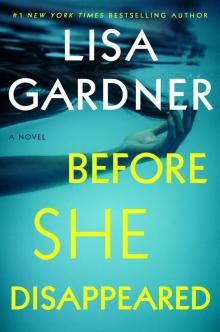 Before She Disappeared
Before She Disappeared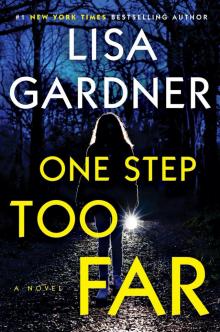 One Step Too Far
One Step Too Far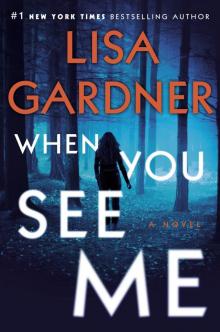 When You See Me
When You See Me Never Tell
Never Tell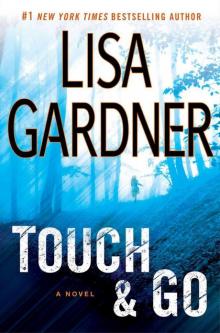 Touch & Go
Touch & Go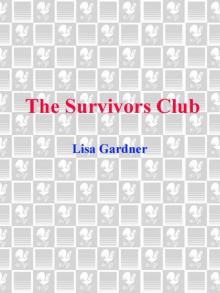 The Survivors Club
The Survivors Club MacNamara's Woman
MacNamara's Woman Love You More: A Novel
Love You More: A Novel Gone
Gone The Perfect Husband
The Perfect Husband Maggie's Man: A Family Secrets
Maggie's Man: A Family Secrets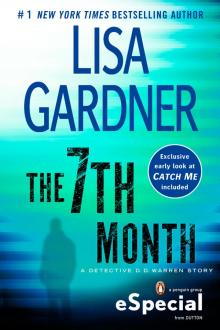 The 7th Month
The 7th Month The Neighbor
The Neighbor Hide
Hide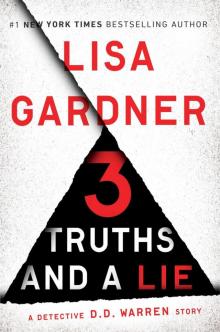 3 Truths and a Lie
3 Truths and a Lie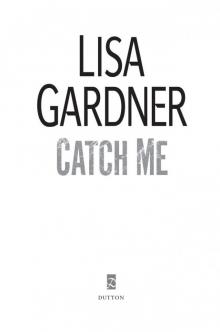 Catch Me
Catch Me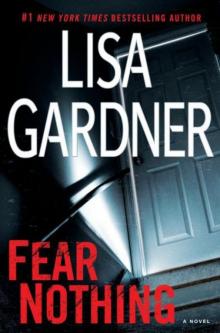 Fear Nothing: A Detective
Fear Nothing: A Detective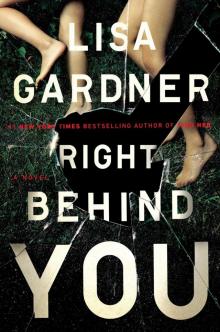 Right Behind You
Right Behind You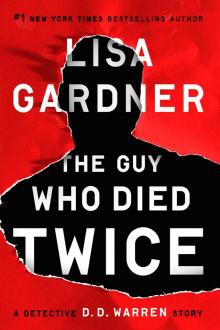 The Guy Who Died Twice
The Guy Who Died Twice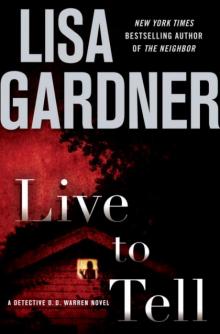 Live to Tell: A Detective D.D. Warren Novel
Live to Tell: A Detective D.D. Warren Novel Live to Tell
Live to Tell Maggie's Man: A Family Secrets Novel
Maggie's Man: A Family Secrets Novel The Other Daughter
The Other Daughter Alone
Alone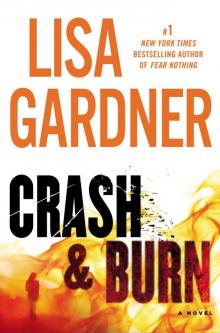 Crash & Burn
Crash & Burn The Detective D. D. Warren Series 5-Book Bundle
The Detective D. D. Warren Series 5-Book Bundle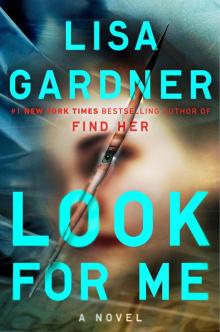 Look for Me
Look for Me Love You More
Love You More The FBI Profiler Series 6-Book Bundle
The FBI Profiler Series 6-Book Bundle The Third Victim (Quincy / Rainie)
The Third Victim (Quincy / Rainie) Say Goodbye
Say Goodbye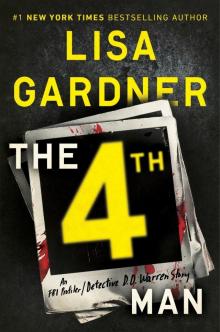 The 4th Man
The 4th Man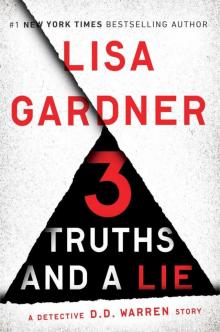 3 Truths and a Lie: A Detective D. D. Warren Story (Kindle Single)
3 Truths and a Lie: A Detective D. D. Warren Story (Kindle Single) Brandon's Bride
Brandon's Bride